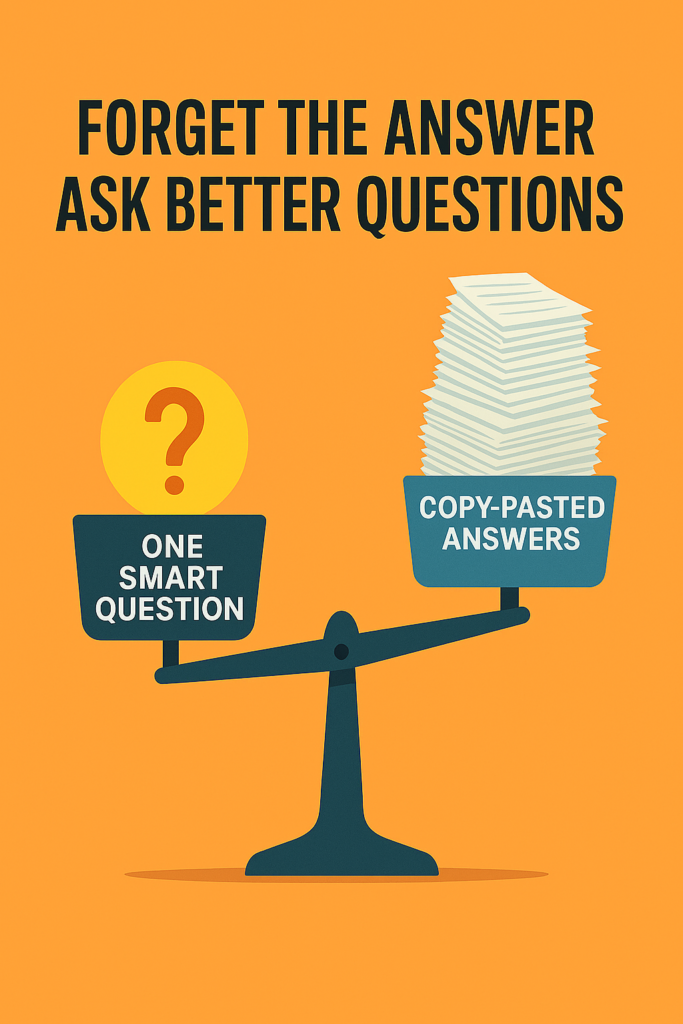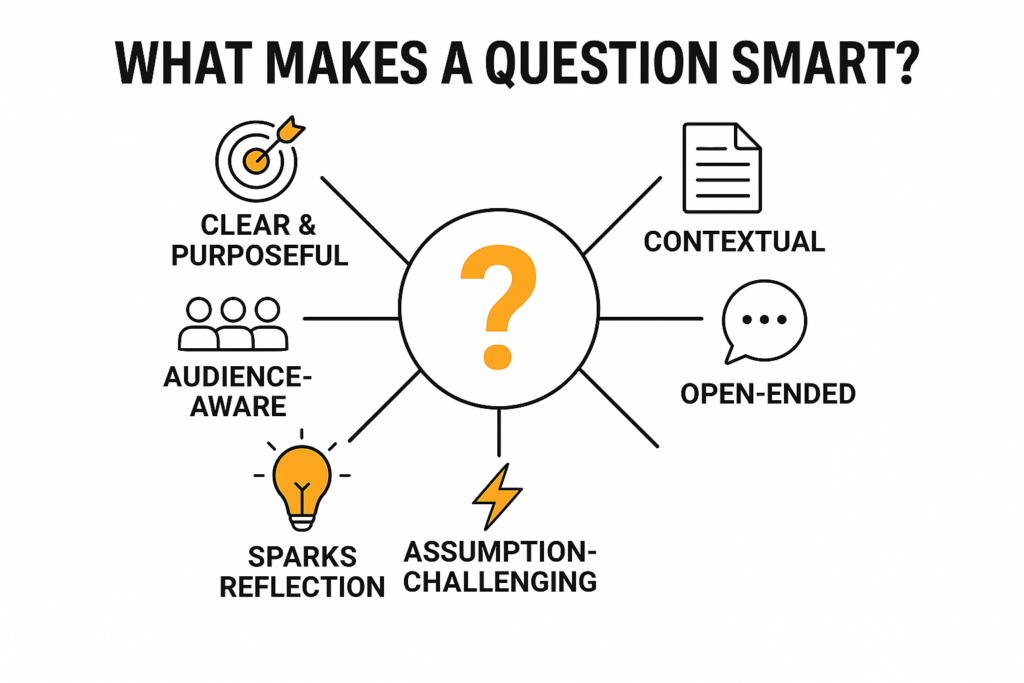What’s the most surprising question you’ve heard lately?
As a mum and the founder of enduri, I was recently stumped by one from my 8-year-old daughter. After a mosquito attack on her legs, she asked with perfect seriousness:
“Mum, do you think the blood in the lower half of my body is sweeter than the blood above?”
I’ll admit, it wasn’t a question I’d ever considered. But it was original, curious, and it made me think. That’s exactly what a great question should do — and it’s exactly what I try to spark with enduri, our learning platform.
In the age of Google and AI, answers are cheap. Questions, however, are priceless. A thoughtful question can open the door to understanding, innovation, and personal connection. As a founder, I believe in question-storming as much as brainstorming. At enduri, we often say: One smart question is worth more than 30 copy-pasted answers.

The message is clear: Ask bravely. Think deeply.
Why Questions Matter More Than Answers
“Judge a person by their questions, not their answers.”
This quote — attributed to Voltaire — feels more relevant than ever. In today’s information-saturated world, what matters is not how fast you can find an answer, but how well you can frame the right question [1].
And the science backs it up. Harvard research shows that learners who ask questions are more curious, more motivated, and more likely to retain knowledge [2]. The effect is especially strong in students with lower prior knowledge — which means that good questions can help level the playing field.
Psychologists even have a name for it: the question-behaviour effect. Once a question is asked, the brain starts working to find an answer. Ask yourself, “Why am I bad at this?”, and your brain offers proof. Ask instead, “How could I get better at this?”, and you open the door to growth [3]. Imagine if class moments were celebrated and points earned when students asked something even Google can’t answer. enduri stands for this question culture. The message is clear: Ask bravely. Think deeply.
What Makes a Question Smart?
Yes, we’ve all heard it: “There are no stupid questions.” But let’s be honest — some questions are smarter than others.
So what makes a question smart?
- Clear and purposeful: It gets to the point and has a goal.
- Contextual: It shows awareness of what’s already been said or learned.
- Open-ended: It invites discussion, not just yes/no answers.
- Assumption-challenging: It pushes boundaries and reveals blind spots.
- Audience-aware: It fits the context and the people involved.
Smart doesn’t mean clever for its own sake. It means intentional and revealing. A simple question like “Why are we doing it this way?” can change the direction of a lesson — or a whole classroom.
At enduri, we train learners to improve their prompts. Instead of asking, “Do you understand this topic?”, we might say: “Write a newspaper headline for the most astonishing part of what you just learned. Make it short, catchy, and irresistible — then discuss it with a classmate.”
We’re not here to test. We’re here to unlock thinking.

Learning to Ask Better Questions
Here’s the good news: good questioning can be taught — and practised.
Students who are encouraged to ask questions tend to learn more effectively and think more critically [4]. One study at Clemson University showed that even brief classroom interventions (e.g. having students generate their own questions during discussions) increased both engagement and comprehension.
A great method is question-storming. Instead of brainstorming answers, students generate as many questions as they can about a topic. At first, the questions might be basic. But quickly, quantity turns into quality. In one study, students who regularly wrote their own quiz questions scored significantly higher in final exams than those who didn’t [5]. Why? Because forming a question forces deeper engagement. It transforms passive learning into active understanding.
You can also build metacognition into the process. Try one of enduri’s strategies, the 4 Cs method:
The four C’s stand for:
Connections: How does the learned content connect to your own life or other things you’ve learned?
Challenges: Which ideas, positions, or assumptions do you question?
Concepts: Which key concepts or ideas do you think are important?
Changes: What changes in thinking or behavior does the content inspire?
Together, these four lenses train students in smart questioning, turning passive reading into active questioning and reflective learning.
Questions as a Metacognitive Superpower
Thinking = questioning. Metacognition = questioning yourself.
When learners ask, “Where did I get stuck?”, “What’s working for me?”, or “What could I try differently next time?”, they’re not just doing homework — they’re managing their own learning. That’s a superpower [6].
Metacognitive questioning is central to the enduri model. We prompt both students and teachers to reflect, not just review. We ask: “What do I need to learn at my best?” “How do I react when I’m stuck?” “What does success feel like for me?”
At enduri, learning is never a monologue. It’s a conversation. And questions are what keep it alive.
enduri: One Smart Question Beats 30 Answers
So, what does this look like inside a digital learning platform?
At enduri, we don’t start with the curriculum. We start with the learner.
The first question is not “What do you know?” but:
“Who are you as a learner?”
This shapes our Three Pillar Model:
- Person & Needs: Students complete a Learner ID, reflecting on their strengths, goals, and mindset.
- Skills & Strategies: They learn how to learn — with questioning as a core strategy.
- Dialogue & Cooperation: Teachers, students, and families are part of a shared conversation. Reflection prompts, coaching comments, and shared goals build a learning culture.
We’re not chasing content. We’re nurturing depth. If a learner asks one insightful question that challenges assumptions, sparks reflection, or starts a conversation — that’s a win.
What’s the next great question you’ll ask — and who will you ask it to?
One student once asked:
“If I forget everything in six months, does it mean I never learned it?” That single question launched a class-wide discussion on memory, meaning, and what really matters in school. You can’t standardise that. But you can nurture it.
So next time you’re facing a challenge — as a teacher planning a lesson, a student reviewing notes, or a parent hoping for a real conversation — don’t just look for the answer. Ask a better question. Because the right question can unlock understanding, spark curiosity, and maybe even shift the trajectory of a life. We’ve talked about how to ask them, why they matter, and how enduri is building a culture around them.
So I’ll end, fittingly, with a question for you:
What’s the next great question you’ll ask — and who will you ask it to?
Sources
- Chevallier, A. & Dalsace, F. (2024). The Art of Asking Smarter Questions. Harvard Business Review.
- Hough, L. (2022). Is It Better to Ask Questions or Listen Carefully? Harvard Ed Magazine.
- Beachboard, C. (n.d.). 3 Strategies for Asking Better Questions. Edutopia.
- Johnson, A. (2022). The Art of Asking Good Questions. Clemson University Extension.
- Shakurnia, A., et al. (2018). The Effect of Question Generation Activity on Students’ Learning. Journal of Advances in Medical Education & Professionalism.
- MIT Teaching + Learning Lab (2023). Metacognitive Prompts for https://tll.mit.edu/teaching-resources/how-people-learn/metacognition/Self‑Directed Learning.

